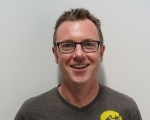



 Name:
Dr Doug Whyte
Name:
Dr Doug Whyte
I am a Senior Lecturer and National Course Coordinator for Exercise and Sports Science in the School of Behavioural and Health Science. I originally studied Physiology at Otago University and then gained my PhD in Physiology and Biophysics at the University of Iowa where I investigated the role specific brain regions play in modulating the cardiovascular response to heat stress. After moving to Australia I took up a position as an Australian Heart Foundation Postdoctoral Research Fellow at the Florey Neuroscience Institute before taking a teaching role in the School of Biomedical Sciences, Charles Sturt University.
My current research focuses on how environmental factors such as heat stress, dehydration and hypoxia influence the nervous system. In particular I am interested in how dehydration impacts cognitive function and skill performance in a range of athletic and non-athletic populations
Boehringer S., D.G. Whyte. Validity and test-retest reliability of the 1080 Quantum System for bench press exercise. Journal of Strength and Conditioning Research 33(12): 3242-3251, 2019.
Swain C.T.V, D.G. Whyte, C.L. Ekegren, P. Taylor, K. McMaster, C. Lee Dow, E.J. Bradshaw. Multi-segment spine kinematics: relationship with dance training and low back pain. Gait and Posture 68:274-279, 2019.
Swain, C.T.V., E.J. Bradshaw, D.G. Whyte and C.L. Ekegren. The prevalence and impact of low back pain in pre-professional and professional dancers: a prospective study. Physical Therapy in Sport. 30:8-13, 2018.
Edwards, R.B., P.J. Tofari, S.J. Cormack and D.G. Whyte. Non-motorized treadmill running is associated with higher cardiometabolic demands compared with overground and motorized treadmill running. Frontiers in Physiology 8:914, 2017.
Filopoulos, D., Cormack, S.J. and D.G. Whyte. Normobaric hypoxia increases the growth hormone response to maximal resistance exercise in trained men. European Journal of Sports Science. 17:821-829, 2017 .
Swain, C.T.V., E.J. Bradshaw, D.G. Whyte and C.L. Ekegren. Life history and point prevalence of low back pain in pre-professional and professional dancers. Physical Therapy in Sport. 25:34-38, 2017.
Wickham, J.B., N.J. Mullen, D.G. Whyte, and J. Cannon. Comparison of energy expenditure and heart rate responses between three commercial group fitness classes. Journal of Science and Medicine in Sport.
Rowe, G.S. and D.G.Whyte. Comparison of the Lactate Pro, Lactate Pro 2 and i-STAT portable blood lactate analysers. Gazzetta Medica Italiana. 175(9):378-383, 2016.
Mullins, A.K., L.E. Annett, J.R. Drain, J.G. Kemp., R.A. Clark, D.G. Whyte. Lower limb kinematics and physiological responses to prolonged load carriage in untrained individuals. Ergonomics 58(5): 770-780, 2015.
Gabbett, T.J., D.G. Whyte, T.B. Hartwig, H. Wescombe, and G.A. Naughton. The relationship between training and competition workloads, performance, and injury in adolescent male football players: a systematic review. Sports Medicine 44:989-100, 2014.
Stewart C.J., D.G. Whyte, J. Cannon, J. Wickham, and F.E. Marino. Exercise-induced dehydration does not alter time trial or neuromuscular performance. International Journal of Sports Medicine 35:725-730, 2014.
Pearce, A.J., G.S. Rowe and D.G. Whyte. Neural conduction and excitability following a simple warm up. Journal of Science and Medicine in Sport. 15:164-168, 2012.
Whyte, D.G., V. Madigan and E.J. Drinkwater. Predictors of academic performance of nursing and paramedic students in first year bioscience. Nurse Education Today 31(8): 849-854, 2011.
McKinley, M.J., R.M. McAllen, D. Whyte and M.L. Mathai. Central osmoregulatory influences on thermoregulation. Clinical and Experimental Pharmacology and Physiology. 35:701-705, 2008.
Teper, Y., D. Whyte, E. Cahir, H.A. Lester, S.R. Grady, M.J. Marks, B.N. Cohen, C. Fonck, T. McClure-Begley, J.M. McIntosh, C. Labarca, A. Lawrence, F. Chen, I. Gantois, P.J. Davies, S. Petrou, M. Murphy, J. Waddington, M.K. Horne, S.F. Berkovic and J. Drago. Nicotine-induced dystonic arousal complex in a mouse line harboring a human autosomal-dominant nocturnal frontal lobe epilepsy mutation. Journal of Neuroscience. 27:10128-10142, 2007.
Whyte, D.G. and A.K. Johnson. Lesions of the anteroventral third ventricle region (AV3V) exaggerate neuroendocrine and thermogenic but not behavioral responses to a novel environment. American Journal of Physiology: Regulatory, Integrative and Comparative Physiology. 292:R137-142, 2007.
Whyte, D.G., T.J. Brennan and A.K. Johnson. Thermoregulatory behavior is disrupted in rats with lesions of the anteroventral third ventricular area (AV3V). Physiology and Behavior 87:493-499, 2006.
Whyte, D.G. and A.K. Johnson. Thermoregulatory role of periventricular tissue surrounding the anteroventral third ventricle (AV3V) during acute heat stress in the rat. Clinical and Experimental Pharmacology and Physiology. 32:457-461, 2005.
Whyte, D.G. and A.K. Johnson. Lesions of the anteroventral third ventricle region (AV3V) disrupt cardiovascular responses to an elevation in core temperature. American Journal of Physiology: Regulatory, Integrative and Comparative Physiology. 288:R1783-1790, 2005.
Whyte, D.G., R.L. Thunhorst and A.K. Johnson. Reduced thirst in old, thermally dehydrated rats. Physiology and Behavior 81:569-576, 2004.
Whyte, D.G. and A.K. Johnson. Lesions of periventricular tissue surrounding the anteroventral third ventricle (AV3V) attenuate salivation and thermal tolerance in response to a heat stress. Brain Research 951:146-149 2002.
CURRENT RESEARCH STUDENTS
Jacqueline Kaiser (Supervisor) Australian Catholic University PhD
PAST RESEARCH STUDENTS
Chris Swain (Supervisor) Australian Catholic University PhD 2018
Dean Filopoulos (Supervisor) Australian Catholic University MEXSc 2015
Grant Rowe (Supervisor) Australian Catholic University MEXSc 2014
Blake McLean (Co-Supervisor) Australian Catholic University PhD 2014
Liam Annett (Supervisor) Australian Catholic University BExSSc(Hon) 2012
Tim Chapman (Supervisor) Australian Catholic University BExSSc(Hon) 2012
Stephen Jarvis (Co-Supervisor) Australian Catholic University BExSSc(Hon) 2011
CURRENT TEACHING
EXSC225 Exercise Physiology
EXSC322 Advanced Exercise Physiology
American College of Sports Medicine
American Physiological Society
Higher Education Research and Development Society of Australasia